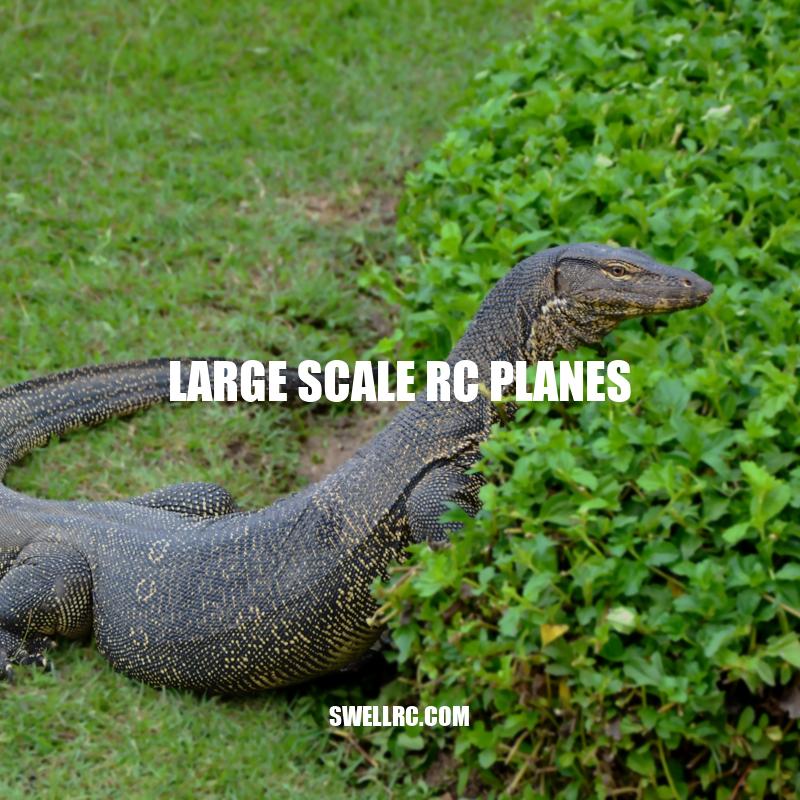Exploring Large-Scale RC Planes: Design, Performance, Maintenance, and Safety
Large-scale RC planes have become increasingly popular among hobbyists in recent years. These planes are incredibly detailed and can be very large in size, often measuring over six feet long with wingspans of up to ten feet or more. Many hobbyists are drawn to large-scale RC planes due to their striking appearance and the thrill of flying them. These planes are often replicas of real-life aircraft, from vintage planes to modern fighter jets. The level of detail and accuracy in these models is impressive, making them a sight to behold in the air. Flying large-scale RC planes requires skill and experience, as well as proper training and precautions to ensure safety. In this article, we will delve into the world of large-scale RC planes, discussing their design, flight performance, maintenance, safety considerations, and the vibrant hobby community that surrounds them.
Design and Build
Large-scale RC planes come in a variety of designs and sizes, but they all share some common elements. Here are some factors to consider when designing and building a large-scale RC plane:
- Scale Accuracy: Many hobbyists take pride in creating a replica of an actual aircraft, which may require extensive research and attention to detail.
- Materials: Large-scale RC planes can be constructed from a variety of materials, including balsa wood, foam, and carbon fiber. The choice of material can impact the plane’s weight, durability, and performance.
- Assembly: Building a large-scale RC plane requires a significant time commitment and an understanding of engineering principles. Pre-cut kits and plans can be purchased online to help guide the building process.
- Cost: Depending on the size and materials used, large-scale RC planes can be expensive to build. It’s important to consider all of the costs involved in building a plane before starting the project.
Some popular websites for purchasing large-scale RC planes and kits include Horizon Hobby, Motion RC, and Great Planes. These websites offer a wide range of products, including kits, parts, and accessories. Researching online forums and joining local flying clubs can also provide valuable information and resources for building and maintaining large-scale RC planes.
How to design a RC plane?
Designing a RC plane is not an easy task, but by following some basic steps, you can build your own plane. Here are a few steps to get you started:
Step 1: Find a purpose for your aircraft.
Step 2: Pick your electronics.
Step 3: Estimate the total weight of your aircraft.
Step 4: Find wing cube loading.
Step 5: Decide on a wingspan.
Step 6: Design your fuselage and tail section.
Step 7: Decide how to transport your plane.
There are plenty of resources online to help with designing your RC plane such as RC groups, Flite Test, and RC Plane Academy. These websites provide detailed information on everything from building materials to wiring and programming your electronics. Additionally, there are many products available for purchase, such as RC plane kits and electronic components.
Flight Performance
Large-scale RC planes offer a unique flying experience, but pilots should understand the capabilities and limitations of their planes before taking to the skies. Here are some factors to consider when it comes to large-scale RC plane flight performance:
- Size: Large-scale RC planes are often heavier than smaller planes, so they require larger flyable areas and may need stronger engines to achieve liftoff.
- Speed and Range: Depending on the plane, large-scale RC planes can reach high speeds and fly for extended periods of time. Some planes are capable of reaching speeds of over 100mph and staying aloft for over an hour.
- Maneuverability: Large-scale RC planes can perform a range of maneuvers, including loops, rolls, and stall turns. Pilots need to practice and develop their skills to perform these maneuvers safely.
- Wind Conditions: Large-scale RC planes can be more susceptible to the wind due to their size. Flying in windy conditions requires more experience and skill.
Large-scale RC planes can be expensive, but they offer a unique and thrilling flying experience. Some popular large-scale RC planes and their specifications are mentioned below:
| Plane Model | Wingspan | Weight | Price |
|---|---|---|---|
| Giant Scale P-51 Mustang | 96 inches | 25-30 lbs | $1,195 |
| Extra 330 SC | 107 inches | 33-38 lbs | $1,500 |
| F4U Corsair | 86 inches | 20-24 lbs | $1,295 |
Several websites offer large-scale RC planes for purchase, including Giantscaleplanes.com and Chiefaircraft.com. Before purchasing a plane, pilots should research its specifications and capabilities to ensure that it meets their needs.
What is considered giant scale RC airplane?
Giant Scale RC airplanes are typically defined as having a minimum wingspan of eighty inches for single-wing airplanes, and a minimum wingspan of 60 inches for multi-wing airplanes. If you are interested in purchasing or learning more about giant scale RC airplanes, there are a variety of websites and products available, such as Horizon Hobby, Tower Hobbies, or the Pilot-RC brand.
LARGE SCALE RC PLANES
Large-scale RC planes require regular maintenance to operate efficiently and safely. Here are some tips for maintaining and repairing large-scale RC planes:
- Inspect the plane’s engine and fuel system before every flight to ensure everything is functioning correctly.
- Regularly check the plane’s control surfaces and linkages for signs of wear and tear.
- Ensure the plane’s landing gear is clean and properly lubricated.
- When storing the plane, cover and protect it from dust and other debris.
- Pilots should have the necessary tools and spare parts on hand in case of mid-flight issues or necessary repairs.
- For more costly repairs, pilots may want to consider taking the plane to a professional RC mechanic or hobby shop for repairs.
Several websites offer RC plane maintenance and repair guides, including RCGroups.com and Flitetest.com. Some websites, such as HorizonHobby.com, sell specialized tools and spare parts for the maintenance and repair of large-scale RC planes. Pilots should ensure they have the necessary tools and parts before starting any repairs on their planes.
Here are some common maintenance and repair tools pilots may want to have on hand:
Tools:
- Screwdrivers
- Needle-nose pliers
- Spare Propellers
- Epoxy and CA glue
- Torque wrench
Proper maintenance and repair of large-scale RC planes is essential to ensure their longevity and optimal performance.
How long can a RC plane last?
The lifespan of a remote-controlled (RC) plane depends on various factors such as quality, usage, and maintenance. Generally, a well-built RC plane can last for years if maintained properly. However, crashes and wear and tear may require replacements or repairs. Some websites like Horizon Hobby and Hobbyking offer a wide range of RC planes, along with replacement parts and repair services.
Safety Considerations
As with any activity that involves flying objects, safety is of the utmost importance when operating large-scale RC planes. Here are some safety considerations for pilots to keep in mind:
- Always fly in a designated flying area that meets safety regulations. Flying in public areas, near buildings or crowded places is both illegal and dangerous.
- Ensure other people are at a safe distance from the plane while it’s in operation.
- Keep the plane within the pilot’s line of sight at all times. Pilots should never fly the plane out of their sight, as they risk losing control and crashing.
- Before every flight, check the plane’s controls and systems to ensure everything is functioning properly.
- Flying in rainy or windy weather should be avoided as it poses a risk to the plane and the pilot.
- Pilots should have a basic understanding of safe operating procedures and flying techniques before taking their plane to the air.
- Ensure the batteries are fully charged and have a proper battery management system in place. Damaged batteries can lead to accidents and potential crashes.
Pilots should also consider joining a local RC club or community to learn more about safe flying practices and techniques. Many RC clubs hold safety seminars and training sessions for new pilots.
Several websites offer safety guidelines and tips for large-scale RC planes, including the Academy of Model Aeronautics at modelaircraft.org. Additionally, websites such as HorizonHobby.com offer safety equipment for RC pilots, such as safety vests, fire extinguishers, and first aid kits.
Safety should always be the top priority when operating large-scale RC planes. By following proper safety guidelines and techniques, pilots can enjoy the hobby while minimizing the risks of accidents or injury.
What is the advantage of RC plane?
RC planes have many advantages. They are perfect for beginners in aero flying and can be used for recreational purposes. One significant benefit is that they can promote creativity and practical skills when constructed in the comfort of your home. In contrast to drones, RC planes are cheaper yet provide an enjoyable flying experience.
Hobby Community
The large-scale RC plane hobby boasts a robust and passionate community of enthusiasts around the world. Here are some aspects of the hobby community that pilots should know:
- There are many clubs and organizations dedicated to the hobby, both local and national. Memberships provide access to online forums, events and hands-on training sessions.
- Many of the clubs host annual events and competitions that attract large crowds of pilots and spectators. These events are an excellent opportunity to showcase your plane’s capabilities and network with fellow pilots
- RC enthusiasts regularly share their experience and expertise online through blogs, forums, and social media. Online communities such as RCGroups.com and FliteTest.com are popular among pilots
- In-person events such as workshops, shows, and expos also provide a great opportunity for pilots to connect and build relationships within the community. These events offer hands-on experience, new techniques, and the latest products and equipment for enthusiasts.
There are numerous websites where pilots can connect with other hobbyists, explore new products and learn more about the hobby. Sites such as RCU, RC Universe, and RCGroups, offer online forums where pilots can ask for advice, share experiences, and explore new aspects of the hobby.
For pilots who are looking to upgrade their planes or purchase new equipment, websites such as HorizonHobby.com and TowerHobbies.com offer a wide variety of products ranging from beginner planes to advanced aircraft. Some of these websites also offer valuable features like customer reviews, video demonstrations, and knowledgeable support staff to help pilot make informed decisions.
By joining the large-scale RC plane hobby community, pilots can connect with like-minded enthusiasts, develop their skills, and discover new aspects of the hobby they may not have known existed.
Can I fly planes as a hobby?
Yes, flying planes as a hobby is absolutely possible! You don’t have to pursue it as a career to enjoy the thrill of aviation. There are various flying clubs and organizations that offer lessons and rentals for recreational pilots. You can also check out websites like AOPA.org or EAA.org for more information and resources on how to get started.
Conclusion
The world of large-scale RC planes offers a thrilling and rewarding hobby for enthusiasts of all levels. By building and flying large-scale RC planes, pilots can enjoy the excitement of flight while developing their skills and connecting with a passionate and supportive community of like-minded hobbyists.
Remember that building and flying large-scale RC planes requires patience, practice, and a commitment to safety. Pilots should carefully consider their skill level and the different planes available in the market before deciding what to purchase. Training and advice from experienced pilots and clubs can also be invaluable for getting started and improving skills.
Overall, large-scale RC planes are an excellent way to experience the joy of flight without leaving the ground. The community of enthusiasts is vibrant and dedicated, providing a wealth of knowledge and resources for pilots looking to take their hobby to the next level.



